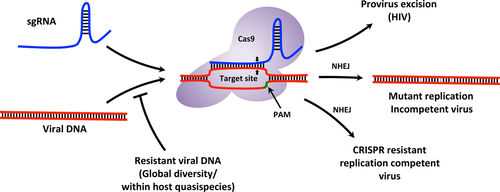当前位置:
X-MOL 学术
›
ACS Infect. Dis.
›
论文详情
Our official English website, www.x-mol.net, welcomes your
feedback! (Note: you will need to create a separate account there.)
CRISPR/Cas9 and Genome Editing for Viral Disease—Is Resistance Futile?
ACS Infectious Diseases ( IF 4.0 ) Pub Date : 2018-03-09 00:00:00 , DOI: 10.1021/acsinfecdis.7b00273 Harshana S De Silva Feelixge 1 , Daniel Stone 1 , Pavitra Roychoudhury 2 , Martine Aubert 1 , Keith R Jerome 1, 2, 3
ACS Infectious Diseases ( IF 4.0 ) Pub Date : 2018-03-09 00:00:00 , DOI: 10.1021/acsinfecdis.7b00273 Harshana S De Silva Feelixge 1 , Daniel Stone 1 , Pavitra Roychoudhury 2 , Martine Aubert 1 , Keith R Jerome 1, 2, 3
Affiliation

|
Chronic viral infections remain a major public health issue affecting millions of people worldwide. Highly active antiviral treatments have significantly improved prognosis and infection-related morbidity and mortality but have failed to eliminate persistent viral forms. Therefore, new strategies to either eradicate or control these viral reservoirs are paramount to allow patients to stop antiretroviral therapy and realize a cure. Viral genome disruption based on gene editing by programmable endonucleases is one promising curative gene therapy approach. Recent findings on RNA-guided human immunodeficiency virus 1 (HIV-1) genome cleavage by Cas9 and other gene-editing enzymes in latently infected cells have shown high levels of site-specific genome disruption and potent inhibition of virus replication. However, HIV-1 can readily develop resistance to genome editing at a single antiviral target site. Current data suggest that cellular repair associated with DNA double-strand breaks can accelerate the emergence of resistance. On the other hand, a combination antiviral target strategy can exploit the same repair mechanism to functionally cure HIV-1 infection in vitro while avoiding the development of resistance. This perspective summarizes recent findings on the biology of resistance to genome editing and discusses the significance of viral genetic diversity on the application of gene editing strategies toward cure.
中文翻译:

CRISPR/Cas9 和基因组编辑治疗病毒性疾病——耐药性无效吗?
慢性病毒感染仍然是影响全世界数百万人的主要公共卫生问题。高效抗病毒治疗可显着改善预后以及感染相关的发病率和死亡率,但未能消除持续存在的病毒形式。因此,根除或控制这些病毒库的新策略对于让患者停止抗逆转录病毒治疗并实现治愈至关重要。基于可编程核酸内切酶基因编辑的病毒基因组破坏是一种有前途的治疗性基因治疗方法。最近关于 Cas9 和其他基因编辑酶在潜伏感染细胞中进行 RNA 引导的人类免疫缺陷病毒 1 (HIV-1) 基因组切割的研究结果表明,高水平的位点特异性基因组破坏和对病毒复制的有效抑制。然而,HIV-1 很容易在单个抗病毒靶位点产生对基因组编辑的抗性。目前的数据表明,与 DNA 双链断裂相关的细胞修复可以加速耐药性的出现。另一方面,联合抗病毒靶标策略可以利用相同的修复机制在体外功能性治愈 HIV-1 感染,同时避免耐药性的产生。这一观点总结了基因组编辑抗性生物学的最新发现,并讨论了病毒遗传多样性对基因编辑策略应用于治疗的重要性。
更新日期:2018-03-09
中文翻译:

CRISPR/Cas9 和基因组编辑治疗病毒性疾病——耐药性无效吗?
慢性病毒感染仍然是影响全世界数百万人的主要公共卫生问题。高效抗病毒治疗可显着改善预后以及感染相关的发病率和死亡率,但未能消除持续存在的病毒形式。因此,根除或控制这些病毒库的新策略对于让患者停止抗逆转录病毒治疗并实现治愈至关重要。基于可编程核酸内切酶基因编辑的病毒基因组破坏是一种有前途的治疗性基因治疗方法。最近关于 Cas9 和其他基因编辑酶在潜伏感染细胞中进行 RNA 引导的人类免疫缺陷病毒 1 (HIV-1) 基因组切割的研究结果表明,高水平的位点特异性基因组破坏和对病毒复制的有效抑制。然而,HIV-1 很容易在单个抗病毒靶位点产生对基因组编辑的抗性。目前的数据表明,与 DNA 双链断裂相关的细胞修复可以加速耐药性的出现。另一方面,联合抗病毒靶标策略可以利用相同的修复机制在体外功能性治愈 HIV-1 感染,同时避免耐药性的产生。这一观点总结了基因组编辑抗性生物学的最新发现,并讨论了病毒遗传多样性对基因编辑策略应用于治疗的重要性。











































 京公网安备 11010802027423号
京公网安备 11010802027423号